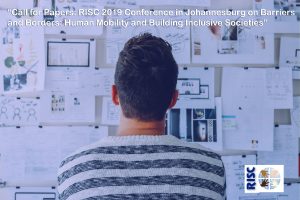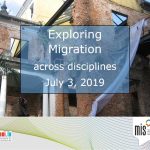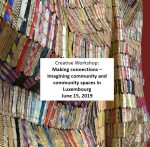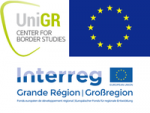Events 2019

RISC Conference on Barriers and Borders: “Human Mobility and Building Inclusive Societies”
November 4, 2019 – November 8, 2019
 November 4-8, 2019
November 4-8, 2019
riscuj2019 (@) gmail.com
Johannesburg
Call for Papers: https://risc.lu/blog/news-1/post/call-for-papers-risc-2019-conference-in-johannesburg-43

Making Connections II
The second “Making Connections”-Workshop on October 19, 2019 from 11h to 15h will take place at the:
Maison de l’Europe
7, rue du Marché-aux-Herbes
1728 Luxembourg
The proposed topic is “Living together – terrain en construction”, and space will be open for you to bring in topics for discussion. However, there will be some creative tasks, as this was a feature many of you enjoyed last time. For these activities, we ask you to bring an object – it can be personal – that raises an issue/ aspect of migration for you. The task is very open and so is the range of topics you might want to think of. The object/and theme can be related to your own personal trajectory or to an issue you perceive and that you would like to bring up in the discussion.
We see this next meeting as a possible springboard for a series of (follow-up) meetings, part of which could by organised by you – many thanks to those who offered this in their feedback form. We will be helping to facilitate the organization as much as we can, in terms of space, resources or other support you might need. This should create room to accommodate a range of ideas and needs, which might not be shared by all. Some of this could also involve discussions leading to some creative art projects – including photography, film, the curation of objects, or the documentation of community activities you are creating – that could be developed over a longer period of time, stretching over several sessions and months. We will provide some examples of what this could involve at the session on 19 October.

Flight – Border – INTEGRATION (3): Colloquium-Series on the Phenomenon of Displacement in Europe in conjunction with Villa Vigoni: „Popularität und Populismus als Formen der Integration/Disgregation“
Die Tagung will den Versuch unternehmen, den Begriff der Integration auf das Spannungsfeld von Popularität und Populismus zu beziehen. Dabei stehen die dem Integrationsbegriff in seinen verschiedenen Verwendungsweisen impliziten, je unterschiedlichen, aber durchaus aufeinander bezogenen Formen von Inklusion und Exklusion im Mittelpunkt des Interesses. So kann analysiert werden, welche Strategien politischer Gemeinschaftsbildung sich mit Popularität und/oder Populismus jeweils verbinden. Es soll also – in einer durch Fallstudien beleuchteten, historisch kontrastiv angelegten Reihe – um die Bindungskräfte gehen, die die Gemeinschaft (nicht die Gesellschaft) in eine (soziale) Form bringen (Verkörperungsformen, Masse, Netzwerke etc.).
Die Tagung organisiert sich in vier Sektionen:
Sektion 1:
Die Hypothese, von der die Tagung ausgehen könnte, wäre, dass Formen sozialer Auszeichnung (Ruhm, Charisma, Popularität, auch die Bedeutung von ‚Ideen‘, ‚Konzepten‘ wie sensus communis) auf lange Sicht zumindest die alteuropäischen Gesellschaften in ihrer (durchaus asymmetrisch gestaffelten) Gemeinschaftsvorstellung an jenem Punkt zu bündeln versuchten, an denen Zusammenhalt durch den Bezug auf einen Dritten (Heros, Feldherr, Herrscher, politischer Führer …) oder auf etwas Drittes (Reich, Monarchie, Republik …, aber auch Sprache) vor Augen zu stellen war. Zu fragen wäre, mit welchen Strategien, Inszenierungen, Symboliken und ‚Rhetoriken‘ solches ‚Bindevermögen‘ zu erzeugen versucht wurde, welche Rückgriffe auf die Vergangenheit vorgenommen werden, ob es performative Transformationsschritte gegeben hat und welche Wirkkräfte dieser Form sozialer Auszeichnung für Gemeinschaftsbildungen bis heute festzustellen sind.
Sektion 2:
Eine andere Form des sozialen Bindevermögens, die bereits die alteuropäischen Gesellschaften charakterisiert, ist ebenfalls mit Popularität assoziiert, aber eher im Sinne von Populärkultur. Populärkultur wäre dann zu verstehen als Verfahren, Verbindungen zu erzeugen, die der dominanten Struktur der gesellschaftlichen Differenzierung zuwiderlaufen – sei es, indem sie Hierarchien unterlaufen bzw. umkehren, sei es, indem sie nicht vorgesehene Querbezüge und unwahrscheinliche Allianzen artikulieren. Diese Form der sozialen Bindung wird beispielsweise in Karnevalskulturen aktualisiert, ist aber auch mit Korruption konnotiert, also mit der unzulässigen Verquickung funktional getrennter Bereiche (man verzi verbunden. Auch mit Blick auf das Populäre der Populärkultur stellt sich die Frage nach den Rhetoriken, in denen es sich entfaltet (z.B. Lied und Popsong, Persiflage), nach den Institutionen, die ihm einen Ort geben (Karneval, Sport, Disco), den Sprachen und Symbolen, die es findet (z.B. Jugendsprache oder ‚Kiezdeutsch‘), und natürlich nach den Transformationen, die es erlebt hat, beispielsweise an der Epochenschwelle um 1800.
Sektion 3:
Bleibt im Falle von Populärkultur häufig latent, wogegen sie sich eigentlich jeweils richtet, etabliert sich im Populismus eine Beschreibung von Gesellschaft, welche die Beziehung von politischer Führung, ‚Establishment‘ etc. und Volk dichotomisch gestaltet und postuliert, dass ‚ein Riss durch die Gesellschaft geht‘. Aktuell bauen die Gemeinschaftsvorstellungen populistischer Bewegungen typischerweise gerade auf diesem Riss auf und versuchen, eine Inklusion durch Exklusion zu erzeugen. Dieses Kippen von Popularität in Populismus gilt es gesondert in den Blick zu nehmen. Ab wann, wäre als erstes zu fragen, wird diese Fremdbeschreibung als ‚populistisch‘ überhaupt kurrent und setzt sich von ‚populär‘ ab (Fallstudie zur historischen Semantik beider Begriffe). Und welche Form des ‚WIR‘ wird in populistischen Bewegungen elaboriert (bleibt das ‚WIR‘ leer und speist sich nur als amorphe ‚Wutmenge‘ aus der Markierung der ‚Laster‘ der Anderen)? Dies führt zu Formen des Konfliktes, der Codierung des Hasses, zu den Semantiken von Verrat, also zu den Topiken des Populismus, die Instrumentalisierung solcher Topiken, auch zum Versuch der Usurpation von Aufklärung, die wiederum mit einer neuen Vorstellung von Expertise zu koppeln ist (WIR sind selbst Fachleute, wir benötigen keine ‚Lügenpresse‘ und keine Gate-Keeper, die uns ideologisch selegierend die wichtigsten Nachrichten vorenthalten). Wünschenswert wären hier ebenso Fallstudien zum gegenwärtigen Populismus in den USA, in Russland und in Italien wie zum Populismus in historischer Dimension (etwa: Welche populistischen Elemente hatte die Französische Revolution?). Und ebenfalls zu beleuchten wäre, ob und, wenn ja, welche Elemente von ‚Popularität‘ auch im Populismus noch nachwirken.
Sektion 4:
Dies führt zu einem letzten Bereich, der das Ziel verfolgt, das ‚Nachrichtensystem‘, die Kommunikationsmedien von ‚Popularität‘ und ‚Populismus‘ und die damit einhergehenden Veränderungen des Öffentlichkeitsbegriffs in den Blick zu nehmen. Dies meint sowohl den Status der ‚Nachrichten‘ (FamaKommunikation) als auch die Transformation und Kombination der Verbreitungsmedien (zwischen mündlicher Kommunikation, schrift-, druck- und bildbasierten Formen), die technologischen Übertragungswege und die Ordnungen der Nachrichtenproduktion, -distribution und -rezeption (Gate-Keeper Ordnungen vs. ‚Schwarmkommunikation‘ mit Emergenz-Effekten), die damit jeweils verbundenen Effekte für die Textsorten und für die Text- wie Informationskomplexität, die Überführung von Öffentlichkeit in Öffentlichkeiten, den Wechsel von Öffentlichkeit und physischer Aktion (Massenbewegungen, Flash Mobs etc.), die Formen und die energetische Aufladung der Auseinandersetzung u.a.m. Auch hier soll es um die wechselseitige Bezogenheit einer ‚alten‘, an ‚kommunikativer Öffentlichkeit‘ und unterschiedlichen Formen von Popularität orientierten Kultur und neuen, technologisch vor allem auf Netzkommunikation beruhenden Formen gehen, in die der Populismus sich jeweils einschreibt.
Teilnehmerzahl: ca. 20 Personen
Format: Gedacht ist an eine Mischung aus Grundsatz- und kürzeren Beiträgen.
October 10-13, 2019
Till Dembeck (till.dembeck (at) uni.lu)

Exploring Migration across disciplines
We often talk about interdisciplinary exchange and wish it to happen. But rarely do we have the occasion to actually engage in it.
MIS researchers cordially invite everyone interested in exchanging about our research and views on migration, mobility and questions attached to this wide and varied field of inquiry
on
Wednesday, July 3, 14.30h – 16.00h
MSH BlackBox
Please bring the following to share:
(*) one small object representing your research
(*) one story/episode that made you understand something important about your topic
(*) the image of a place that has been crucial to your research work
(*) one question that is bothering you at the moment
(*) one idea for a project you would like to do
If you wish to participate, please send a short message to nicole.holzapfel-mantin (@) uni.lu
We look forward to seeing you. All welcome.
Gabriele Budach (on behalf on the MIS team)

Creative Workshop: Making connections – Imagining community and community spaces in Luxembourg
This creative workshop will take place on
Saturday, June 15, from 11:00 h to 15:30h
at the University of Luxembourg, Belval Campus, Maison des Sciences Humaines (MSH), in the Blackbox.
This workshop is addressed to community members and leaders, from community organisations, researchers and students, and it seeks to create dialogue and to make connections between us and our different perspectives and experiences.
Lunch will be provided and costs for public transportation (within Lux) will be reimbursed, on request.
The program of the day will include
(*) a discovery walk on campus,
(*) lunch and a gallery walk providing opportunity to share, talk and connect,
(*) a creative workshop in small groups (up to 5 people per group) in which you are invited to design your ideal community space.
*We ask all participants to bring:
1 small object that tells something about you as a person and 3 print outs (A4) of photographs (taken by you or from other sources – if you don’t have the opportunity to print, please contact us).
The photographs should show:
- a) an item that represents community for you,
- b) a space in which you feel comfortable,
- c) an activity you would like to see happening in a community space.
If you are running or involved in a community organization please bring promotional material you would like to share.
If you are a researcher/student interested in related topics, please bring a poster explaining some of the issues you are exploring in your research.
Please follow this link to register until June 3, 2019 for this event: https://ulsurvey.uni.lu/index.php/762567?lang=en
Please note that places for the event are limited. First come, first serve – so please, sign up quickly.
For further information, please contact roberto.gomezfernandez (at) men.lu
We look forward to welcoming you in Belval! Gabriele Budach & Roberto Gómez Fernández

Seminar: Critical Approaches to Migration: Inquiry into the Social and Historical Construction of Culture
Alison Elizabeth Lee, PhD
Universidad de las Américas Puebla
The notion of culture embraced by anthropologists since the late nineteenth and early twentieth centuries derived from Enlightenment thought. Diversity in practices and beliefs stemmed from the acquisition of knowledge and habits by individuals as members of social groups in specific contexts. Anthropologists and others used cultural relativism to combat racism and anti-immigrant sentiment as well as to study and explain cultural difference. However, the lack of historical contextualization of culture in unequal fields of power—a legacy of theoretical approaches that never grappled with the implications of colonialism and imperialism—led to the creation of models of essentialized identities and hardened boundaries of cultural difference. Across seemingly rigid cultural divides, the dehumanization of racial, ethnic, and gendered “Others” justifies structural, institutional and direct forms of violence. In the two readings selected for this seminar, we will confront the “dark side” of the culture concept by examining how the authors discuss Triqui culture and its intersection with migration.
What are the elements of Triqui culture the authors select for their discussions?
How do they historically contextualize Triqui culture?
How is this discussion of Triqui culture important for understanding the Triqui’s national and international migration flows?
Harlan Koff (harlan.koff (@) uni.lu)

Public Lecture: Dr. Alison Lee, Universidad de las Américas Puebla “¿Por qué sirvió migrar?” (Why did it serve to migrate?): Gender and Return Migration to Central Mexico
Studies of return migration tend to view it as the outcome of decisions made by rational actors or as a vehicle for the transfer of human capital to sending regions. An alternative approach, inspired by historical-structural theories, views return migration as one moment in a tumultuous process of workers alternatively absorbed and expelled from labor markets restructured in the transition from Fordist to flexible regimes of accumulation. Based on ethnographic research in Mexico and the United States, this paper traces the emergence, acceleration and contention of a transnational working class from Central Mexico beginning in the 1980s. Escaping the creative destruction of rural economies produced by neoliberal policies, men and women inserted into the industrial and service economies on the U.S. East Coast as flexible, precarious and “illegal” labor. The global financial crisis of 2007-08 weakened immigrant labor markets while increased border and interior surveillance ramped up deportations to Mexico diminishing the circular flow of undocumented migrants. The emerging gendered subjectivities of return migrants illuminate how they contend with the contradictory inclusion/exclusion of “illegality” in the context of declining opportunities to improve social and economic mobility through transnational migration. The tensions and conflicts that traverse family and community relationships reflect broader divisions and hierarchies within the Mexican migrant working class that have historically served to discipline labor and shore up accumulation.
MSH, ground level, room 0015040 (2.07)
For more information please contact
Harlan Koff (harlan.koff (@) uni.lu)

Study trip to Lisbon
Part of MA course
Oliver Kohns (oliver.kohns (@) uni.lu)
April 23-27, 2019

Forum Großregion UniGR-Center for Border Studies „Migrationsbewegungen und Grenzen: Zwischen Regulierung und Integration”
Registration until March 10, 2019
https://www.uni-gr.eu/de/node/2905
March 14, 2019, 16h
Haus der Großregion (Esch-sur-Alzette)
Birte Nienaber (birte.nienaber (@) uni.lu)

